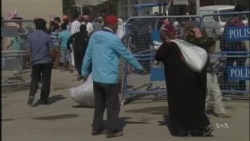The world is facing the worst refugee crisis in modern times – and the global response has been pitifully inadequate, according to the latest annual report from the United Nations High Commissioner for Refugees. Humanitarian groups are calling for a global summit to address the crisis.
Exhausted, sunburned, dehydrated and carrying nothing but a bag of clothes, Syrian refugee Sameh, his wife and his son limp across the dockside in Catania, Italy, after disembarking an Irish navy boat.
They and hundreds of others were rescued this week from rubber dinghies in the Mediterranean Sea.
“Every human on this planet loves their country,” Sameh says. “But the situation in Syria would force anyone to look for safe shelter and a safe country, for themselves, for their wife, for their children,” said Sameh.
Sameh and his family are part of an exodus of epic proportions. The U.N. says that by the end of 2014, more than 60 million people were forced to flee their homes - the biggest displacement of the human race ever recorded.
Watch related video by VOA's Zlatica Hoke:
More than 100,000 migrants have crossed the Mediterranean to Europe so far this year. Close to 2,000 have died. Europe’s crisis is far from the full picture, says U.N. refugee agency official Andrej Mahecic.
“The Mediterranean is perhaps only the visible consequence of what we are seeing globally. Let’s not forget that 86 percent of the world’s refugees are hosted by the developing nations. For example, Syria has been the largest single driver of displacement over the past four years. Most of the Syrians have found refuge in the neighboring countries, nearly four million of them,” says Mahecic.
Harrowing images this week showed Syrian refugees fleeing fighting between Islamic State and Kurdish forces trying to break through the border fence to Turkey. Syria’s neighbors are trying to stem the flow of refugees. They have received pitiful support from the international community, says Anna Shea of Amnesty International.
“In Lebanon, one in five people is now a refugee. Turkey has the largest Syrian refugee population at over 1.7 million people. So, in the face of this massive influx of people in a short amount of time, countries are resorting to troubling measures,” says Shea.
Amnesty describes Africa’s refugees as the world’s forgotten crisis. There are more than three million in sub-Saharan Africa alone.
“What’s really striking is that a lot of countries are the source and destination for refugees. So countries that are persecuting people and where people are suffering human rights abuses are themselves welcoming refugees,” says Shea.
She says the inadequacy of the global response was highlighted last month as thousands of ethnic Rohingya refugees from Myanmar were left drifting in the Andaman Sea for weeks – as no country would accept them. Indonesia and Malaysia have now offered temporary resettlement.
The world is entering a dangerous era where the humanitarian response is dwarfed by the scale of the refugee crisis, says the U.N.’s Andrej Mahecic.
“Over the past five years, 15 conflicts erupted in various parts of the world. Eight of them in Africa alone. Three in the Middle East – just to name Syria, Iraq, Yemen. Another one in Europe, Ukraine. This unprecedented displacement requires an unprecedented response,” says he.
Mahecic adds that the only long-term hope is a political solution. But many of these conflicts are intensifying - and the number of people forced to flee for their lives continues to grow.






